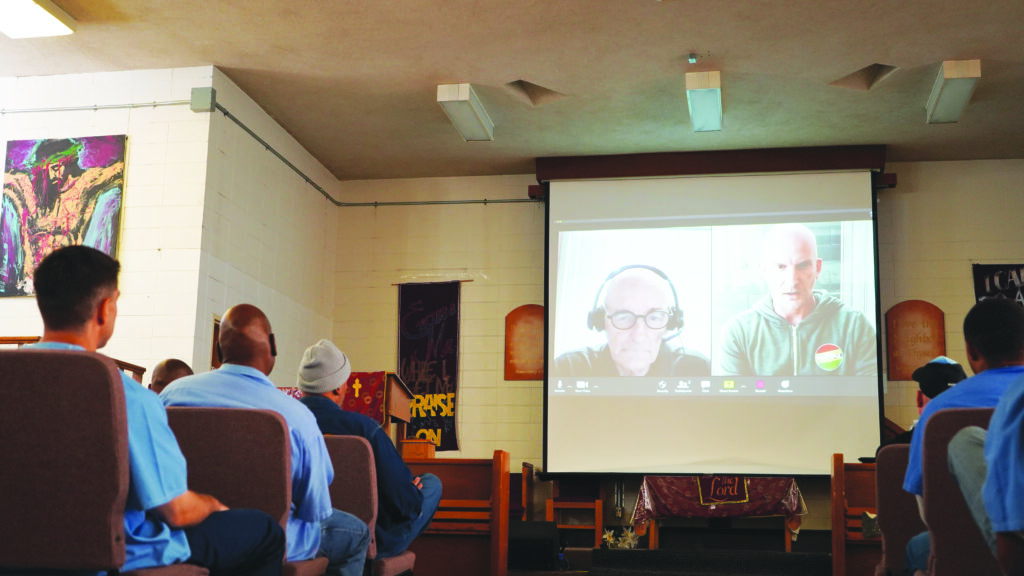
Some religionists might look for their places of worship in churches, in temples, in consecrated edifices representing their assorted forms of faith. Others might look for them in nature. Leon Logothesis looked for his places on the road. His spirituality involved travel, motion, motility and mobility — to stay static seemed anathema to him — and he recorded it all on film with the idea of “if you seek change, then go out into the world.”
Although Logothesis described his film as secular, The Kindness Within had a definitive spiritual bent. Speaking at San Quentin, dressed in a black hoodie, brown trousers, trainers, and a baseball hat, Logothesis looked thin, athletic, and fit. He confirmed his British accent as coming from North London.
“I have never been incarcerated physically,” he said at the start of his motivational movie event, “but in my mind, I have been incarcerated all my life.” He said he used to work as a broker in the City of London (the term referred to London’s financial district) but he declined to reveal the name of his former employer.
Logothesis referred to himself as “The Kindness Guy.” He called it “a nickname that I did not receive because I am very kind.” For Logothesis, kindness functioned as the key ingredient that gave humans their humanity. Logothesis said he had traveled the world to prove it human by relying exclusively on the kindness of strangers to supply him with meals and gasoline for his motorcycle.
“On the outside, I had everything I wanted, but on the inside, I wore a mask — and not a Covid mask,” said Logothesis about a façade that had long prevented him from sharing his emotional pain. “If we do not share our emotional pain, it will consume us, it will destroy us.”
The Kindness Within started with a quotation from Atticus, “Your scars are not your shame; they are your stories.” Logothesis conceived his film as a spiritual travelogue of India. He took his film crew there with the idea that he “would not leave until God is revealed to him.” The journey, “was not just an adventure, it was my last chance.”
In New Delhi, he walked the crowded streets wearing a brown T-shirt that said “Ignite Your Spirit.” Logothesis presented to the audience not just his ego, but also his id. His stream of consciousness meandered into sub-consciousness as his explorations of the various religions meandered into expressions of universal grace.
In Diara, his next location, he visited the Church of St. John of the Wilderness. His central question of “How does someone who wants to be connected to God, meet God?” soon received the answer that he would meet God if he read the Bible. At departure, he said the church left him feeling moved.
At the Ajmer Sharif Mosque, his central question found the answer, “Pain is a source of blessing,” for “pain is the wound where light enters.” Logothesis said, “Today, you have taken care of my heart, and I will never forget that.” Logothesis admitted, “By facing my pain, the dam broke. There was no turning back.”
He traveled to Dharamshala (in the Himalayas) next, a location well known as the home of the Dalai Lama. The place inspired him to conclude that the religions he encountered all have in common that the will of God revealed itself differently to each seeker.
Logothesis soon met with a Buddhist who believed in personal responsibility rather than a God. Next, a Rabbi put the truth to him plainly: “If somebody does not like himself, then how can he help others?”
In Amritsar, Logothesis visited the Golden Temple of the Sikhs. He donned an orange turban to blend in and began to serve God by serving meals in an organization that served 200,000 meals a day and turned away no one. The scale and the magnitude impressed him so much that he declared having found purpose and “Service at the very heart of divinity.”
He said, “If God is Love, then I just met God.” The film’s denouement arrived with Logothesis’ declaration that “The broken pieces had been put back together and I felt home.”
In a final jaunt to Rishikesh, he received two more pieces to his puzzle: “Truth is a magnet. Peace is a magnet.” He concluded to commit to peace within and then to share the peace.
He said good-bye to India and returned to his home in Los Angeles, satiated, enlightened, and ready to spread his word. So endeth the spiritual journey of Leon Logothesis.